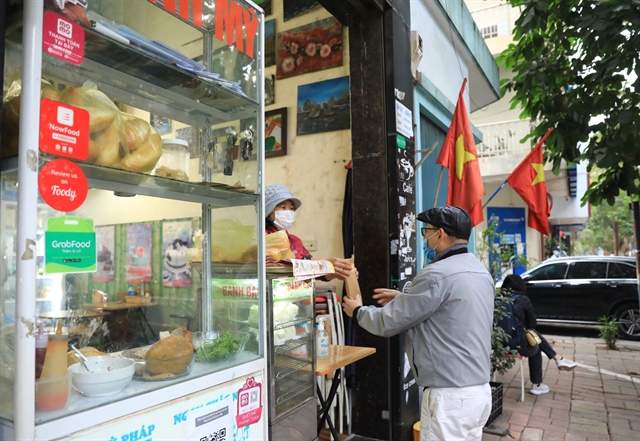
HÀ NỘI — As the capital city changes its pandemic risk levels, Hà Nội business owners have been struggling with onsite dining regulations.
While restaurants in some districts are allowed to open for in-person dining, others close by are told they can only operate take-away services, even though the eateries are near to each other.
This has left some food store owners with a bitter taste in their mouths.
“It is just one street away, but while the opposite stores are allowed in-person dining then mine could still only sell take-aways,” said Hạnh (not her real name), a shop owner on Bà Triệu Street, Hai Bà Trưng District.
“It’s disheartening to look at because we are all struggling.”
Her store was located in one of the nine wards at level 3 (high risk) of the COVID-19 pandemic.
Speaking to Tiền Phong (Vanguard) newspaper, Hạnh said when she heard the news that the whole district is now placed at level 2, she could not help but feel excited after weeks of allowing take-away only.
“We are a [small] coffee shop, so take-away is basically not selling anything at all because almost none of our customers buy drinks to take home,” she said.
For the past two years, Hạnh’s business has been significantly impacted by COVID-19. The lockdowns were long, and normal operations were only able to resume for a little while before regulations forced them to close or only allow take-away.
“We spend tens of millions of đồng on rent every month, and on top of that is the staff payroll. It is only getting more difficult this way,” said Hạnh.
She believes that if some stores are allowed to be open then all should resume as normal, especially when people are fully inoculated and the country has been told to safely and flexibly adapt to the pandemic.
In the same situation, Dương (not his real name), another business owner in Cầu Giấy District has had to close his restaurant as the district increased its pandemic-risk level.
“We had only been able to open onsite dining for a while, now it’s take-away again.
“At this rate, we might as well be closed until after Tết (Lunar New Year) as there is not much time until the holiday. We don’t know when the district will return to level 2 (medium risk) either.”
Authorities in Hoàn Kiếm District, which has recently increased its pandemic risk level, said that almost all business owners follow the regulations and adapt to the new situation quickly, as they have gotten used to changes. However, there are complaints about the difficulties of allowing only take-away.
While the whole district was still considered a high-risk area, Hoàn Kiếm has recently allowed in-person dining at half capacity in five medium-risk wards (Phan Chu Chinh, Trần Hưng Đạo, Hàng Trống, Tràng Tiền, and Hàng Bạc), except for pubs and bia hơi (draught beer) venues.
An official of Hoàn Kiếm District People’s Committee said that the decision strictly follows the guidance of Resolution No. 128 on safe adaptation, flexibility and effective control of the COVID-19 pandemic.
The official said: “The decision for these five wards is expected to create a healthy competition between the localities. Therefore, people will be more aware and strive to decrease the risk level to soon resume operation as normal.”
In addition to Hoàn Kiếm, other districts including Hai Bà Trưng, Tây Hồ, Đống Đa, have made changes regarding non-essential activities in accordance to the pandemic-risk level, in order to facilitate socio-economic development. It is a good sign, according to health experts.
Meanwhile, a representative of Hà Nội Centre for Disease Control (CDC) said that stopping onsite dining in high-risk areas has significantly limited transmissions.
“Although diners can move from one area to another, halting in-person dining and large gatherings in high-risk zones still reduce the spread of the virus and limit transmissions in the community,” said the CDC representative.
Dr Nguyễn Huy Nga, former head of the General Department of Preventive Medicine (under the Ministry of Health) believed that Hà Nội should follow the steps of HCM City in resuming the operation of restaurants, and even bar and karaoke venues.
According to Nga, statistics reveal that the new case count in HCM City is decreasing despite reopening of many venues, contributing greatly to economic recovery and a more stable state of mind for the people.
He also noted that as they reopen, it is necessary to pay attention to senior citizens, people with underlying health conditions, and children, as well as severe cases. Young people, even when infected, mostly experience mild symptoms and are not in grave danger as they are protected by the vaccine.
On Tuesday, Prime Minister Phạm Minh Chính issued a new direction on COVID-19 prevention and control, which required the health ministry to adjust the implementation of unsuitable measures.
The dispatch came as several online articles reported the constant changes in onsite dining regulations, and the people voiced out inappropriate management and quarantine measures in several localities. — VnExpress News
- Reduce Hair Loss with PURA D’OR Gold Label Shampoo
- Castor Oil Has Made a “Huge” Difference With Hair and Brow Growth
- Excessive hair loss in men: Signs of illness that cannot be subjective
- Dịch Vụ SEO Website ở Los Angeles, CA: đưa trang web doanh nghiệp bạn lên top Google
- Nails Salon Sierra Madre
 VnExpress News The News Gateway of Vietnam
VnExpress News The News Gateway of Vietnam





